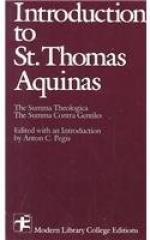
|
| Name: _________________________ | Period: ___________________ |
This test consists of 15 multiple choice questions and 5 short answer questions.
Multiple Choice Questions
1. What location of truth does the author question?
(a) Whether truth resides only in the intellect.
(b) Whether there is truth in heaven.
(c) Whether truth resides in God.
(d) Whether man can be truthful.
2. What is a Thomist?
(a) Someone who is named after Saint Thomas Aquinas.
(b) Someone who is a disciple of Saint Thomas Aquinas.
(c) Someone who teaches Saint Thomas Aquinas' philosophies.
(d) Someone who is especially well-versed in the work of Saint Thomas Aquinas.
3. Aquinas observes that while "the Philosopher" claims that the human intellect can have perfect knowledge, he uses Aristotle to refute this. He cites an observation made in De Anima to prove this. What does he say is in the mind's understanding of things?
(a) Truth.
(b) Truth and falsehood.
(c) Truth and lies.
(d) Falsehood.
4. Aquinas supports God as self-evident but again shows his existence through _________________.
(a) Faith.
(b) Demonstration.
(c) Grace.
(d) Analogies.
5. What does Aquinas mean by truth that is immutable?
(a) It must be changed in some circumstances.
(b) It can be changed.
(c) It changes often.
(d) It does not and cannot be changed.
6. From where do some of the objections come in regards to whether the intellectual principle is united to the body as its form?
(a) The Socratic Method.
(b) Plato's studies.
(c) Aristotle's rhetoric.
(d) DesCartes type of dualism.
7. What is the trilogy of men of Athens?
(a) Socrates, Plato, and Diogenes.
(b) Socrates, Plato, and Aristotle.
(c) Socrates, Diogenes, and Aristotle.
(d) Plato, Aristotle, and Diogenes.
8. Damascene is named after what?
(a) The leader of his country.
(b) Damascus, Syria which was his homeland.
(c) A god.
(d) His mother's maiden name.
9. Objections and refutations to those objections are presented for what reasons?
(a) So that readers can follow the line of thinking.
(b) To confuse readers.
(c) So that readers can choose their own beliefs.
(d) To give options of possible beliefs.
10. Does truth exist in the intellect?
(a) Most likely.
(b) Yes.
(c) No.
(d) Probably.
11. What is equally much an element of soul, and in this manner the life-giving breath of God is included?
(a) The life force.
(b) Creation.
(c) Angels.
(d) Humanity.
12. In what must the exemplar of the order of things towards their end exist?
(a) The divine mind.
(b) Nature.
(c) Our minds.
(d) Our hearts.
13. Many of the questions in the Summa Theologica are ____________________.
(a) Short and simple.
(b) Worthless and false.
(c) Boring and confusing.
(d) Long and complex.
14. What is the format designed to suit?
(a) Debate and logical argumentation.
(b) An educational setting.
(c) Those interested in philosophy.
(d) Those who study theology.
15. According to Aquinas, Aristotle says that the soul is only separable from the body inasmuch as what?
(a) The separation of mind and body at death.
(b) God wants it to be.
(c) Thoughts and practices are.
(d) One believes it to be.
Short Answer Questions
1. Aquinas did not have the advantage of what?
2. The idea of spontaneous generation has been extended to who?
3. Is there Will in God?
4. What power must we assign to Him in the highest degree?
5. How was Aquinas able to write this work?
|
This section contains 534 words (approx. 2 pages at 300 words per page) |

|




